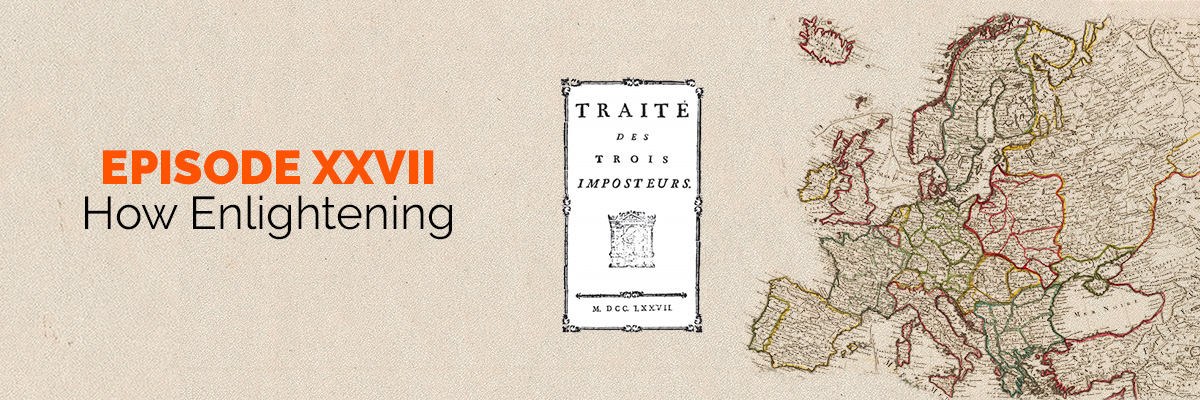After a brief detour into the present, we return to Ground Zero of the Enlightenment in 18th century Europe, with this recap of past episodes and a brief overview of the themes and countries to be explored in the upcoming episodes as rationality and secularization sweep the continent turning tradition and authority upside down. Among others we touch upon:
- How the early enlightenment resulted in greater religious tolerance’
- Why tolerance did not automatically go hand in hand with freedom of speech
- How the “Dutch Dark Web” spread radical philosophy across Europe through clandestine printing presses and networks
- How the treatise of “The Three Impostors” shocked Europe
- How women enjoyed greater “conversational freedom” to discuss science, philosophy, and religion
- How erotic and obscene literature made headway across the continent
- Why European states´ book production and consumption went hand in hand with their respective censorship regime
Why have kings, emperors, and governments killed and imprisoned people to shut them up? And why have countless people risked death and imprisonment to express their beliefs? Jacob Mchangama guides you through the history of free speech from the trial of Socrates to the Great Firewall.
You can subscribe and listen to Clear and Present Danger on Apple Podcasts, Google Play, YouTube, TuneIn, and Stitcher, or download episodes directly from SoundCloud.
Stay up to date with Clear and Present Danger on the show’s Facebook and Twitter pages, or visit the podcast’s website at freespeechhistory.com. Email us feedback at freespeechhistory@gmail.com.
Literature:
- Buringh, E. & van Zanden, J. (2009). ‘Charting the “Rise of the West”: Manuscripts and Printed Books in Europe, A Long-Term Perspective from the Sixth through Eighteenth Centuries’. The Journal of Economic History, vol. 69, No. 2 (June 2009).
- Darnton, R. (1971). ‘Reading, writing, and publishing in eighteenth-century France: A case study in the sociology of literature’. Daedalus 100(1), pp. 214–256.
- Delpiano, P. (2018). Church and Censorship in Eighteenth-Century Italy: Governing Reading in the Age of Enlightenment (Routledge Research in Early Modern History). Taylor and Francis. Kindle Edition.
- Edoardo, T. (2016). The Invention of Free Press.
- Fichtner, P.S. (2011). ‘Print versus Speech: Censoring the Stage in Eighteenth-Century Vienna. In: Powers, E. (ed.). Freedom of Speech: The History of an Idea. Bucknell University Press.
- Grell, O.P. & Porter, R. (1999). Toleration in Enlightenment Europe. Cambrdige University Press.
- Israel, J. (2011). ‘Libertas Philosophandi in the Eighteenth Century: Radical Enlightenment versus Moderate Enlightenment (1750–1776)’. In: Powers, E. (ed.). Freedom of Speech: The History of an Idea. Bucknell University Press.
- Israel, J. (2010). A Revolution of the Mind.Princeton University Press.
- Israel, J. (2008). Enlightenment Contested. Oxford University Press.
- Israel, J. (2001). Radical Enlightenment: Philosophy and the Making of Modernity 1650-1750. Oxford University Press.
- Jacob, M.C. (2000). The Enlightenment: A Brief History with Documents. Bedford / St. Martin’s.
- Laursen, J.C. (2011). ‘Cynicism and Ideology behind Freedom of Expression in Denmark-Norway’. In: Powers, E. (ed.). Freedom of Speech: The History of an Idea. Bucknell University Press.
- MacCulloch, D. (2004). Reformation: Europe’s House Divided, 1490–1700.
- Nadler, S. (2011). A Book Forged in Hell: Spinoza’s Scandalous Treatise and the Birth of the Secular Age. Princeton University Press.
- Powers, E. (2011). Freedom of Speech: The History of an Idea. Bucknell University Press.
- Robertson, J. (2015). The Enlightenment. A Very Short Introduction. Oxford University Press.
- Rosenblatt, H. (2011). ‘Rousseau, Constant, and the Emergence of the Modern Notion of Freedom of Speech’. In: Powers, E. (ed.). Freedom of Speech: The History of an Idea. Bucknell University Press.
- Sebastian, J.F. (2011). ‘The Crisis of the Hispanic World: Tolerance and the Limits of Freedom of Expression in a Catholic Society’. In: Powers, E. (ed.). Freedom of Speech: The History of an Idea. Bucknell University Press.
- Standage, T. (2013). Writing on the Wall: Social Media – The First 2,000 Years. Bloomsbury.
- van Eijnatten, J. (2011). ‘In Praise of Moderate Enlightenment: A Taxonomy of Early Modern Arguments in Favor of Freedom of Expression’. In: Powers, E. (ed.). Freedom of Speech: The History of an Idea. Bucknell University Press.
